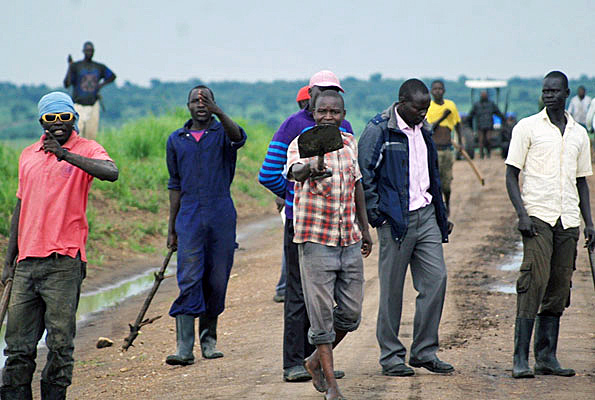PBS: Escaping Eritrea … [Read More...] about ካብ ውሽጢ ቤት ማእሰርታት ኤርትራ
Uganda: Two MPs escape lynching over land
By JULIUS OCUNGI, May 4 2015, Daily Monitor (Uganda)
AMURU. In what makes land disputes in Acholi a matter of national concern, two Members of Parliament escaped lynching at the weekend over another fight involving more than 6,000 hectares of land in Amuru District.A group of more than 10 people from one family in Apaa Ogali village, Amuru Sub-county, attempted to lynch Kilak County MP Gilbert Olanya and Amuru District Woman MP Lucy Akello when the two went to mediate in a land dispute.

The dispute pits the family of the late Yosani Ojwang and an Australian investor on the one side, and the rest of the community on the other.
The villagers accuse the former of encroaching on their land. Mr Olanya and Ms Akello and other local leaders had paid a visit to the village after women there accused area police of assault following an alleged night raid on the village last Thursday. Mr Olanya, who first met with the aggrieved residents, later attempted to reach out to the investor, Mr Linton Brimblecombe, and Ojwang’s family, whose alleged land, measuring about 6,000 hectares, is at the heart of the dispute.
The MPs were, however, stopped by people with spears, bows and arrows, who told them not to step on their land. It took the intervention of the police to restrain the armed men, who were poised to attack the MPs. Under police protection, the MPs were able to speak to Ojwang’s family and the investor. Mr Olanya told Daily Monitor: “This is a small matter that didn’t need Ojwang’s relatives and children to pick up arms against their leaders and threaten to kill them. We need to sit and see where their land ends and where the locals claim theirs is.”
Mr Brimblecombe, the investor, who owns Omer Farming Company Limited, and is accused of encroaching on people’s land, denied buying the land.
“I don’t love to see violence, especially on claims that my investment is making locals uncomfortable. I have never bought any land here and I am just renting the said land from Ojwang’s family,” he said. He said he would meet the residents over the matter. Mr Epedu David, the officer in-charge of crimes at Amuru Police Station, denied knowledge of the said raids in the area and promised to investigate the matter.
“We have not been formally informed of any arrest and assault on women made in this area; we, however, encourage residents to report the matters with evidence so that we follow it up.”
The family of Ojwang allegedly sold part of the land, including a part that belongs to other locals, to an investor Mr Linton Brimblecombe, who has since established a maize farm.
Acholi sub-region is becoming a hotspot for violent land fights, which, if not addressed immediately, could result in a crisis.
In Lamwo District at the weekend, six people were admitted to Kitgum hospital after they sustained injuries during another land fight between the Pawaja clan in Paloga Sub-county and the Pobira clan in Wigweng village, Madi- Opei Sub-county. These confrontations come barely three weeks after women in Apaa Parish, Pabbo Sub-county, Amuru District, stripped before ministers Daudi Migereko and Aronda Nyakairima over the boundary demarcation conflict between Adjumani and Amuru districts.
Recent Land disputes
Last month, Agago District chairperson Peter Odok Oceng castigated police and cultural leaders for their alleged negligence in the land clashes which left a four-year-old boy dead and 13 other people injured. A land dispute between residents of Aciki village in Ogong Parish in Kotomor Sub-county and those from Lukwangole Parish in Patongo Sub-county left 24 people arrested by police. More than 60 grass-thatched huts were also razed in the attack, leaving properties worth millions of shillings destroyed.
Last year, 30 grass thatched huts were razed after locals in Aciki attacked Luwangole clan over the same dispute. Acholi sub-region, which comprises Agago, Amuru, Gulu, Kitgum, Lamwo, Nwoya and Pader districts has had several flashes of land conflicts since 2006 when the Lord’s Resistance Army (LRA) rebels were kicked out of the area. The warring communities are part of an estimated 1.8 million people in the region who lived in displaced persons camps for more than a decade. Returnees, however, found their land occupied by strangers, family members with no rights to the land.
Lost or shifted boundary landmarks such as trees and mark stones have exacerbated land disputes.
